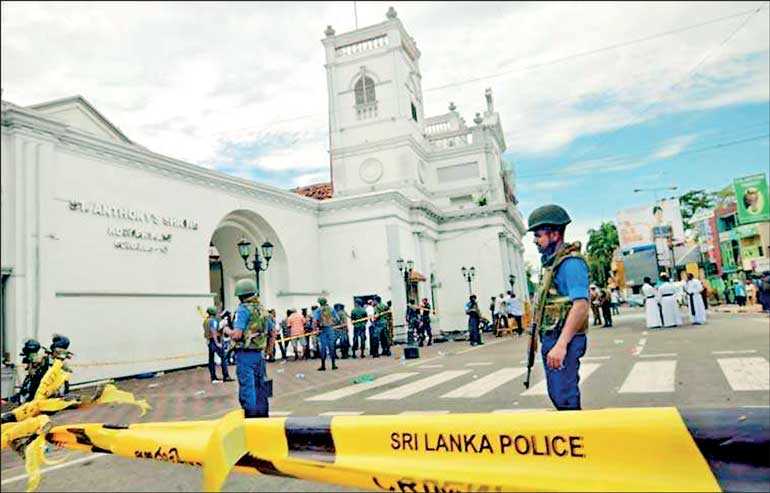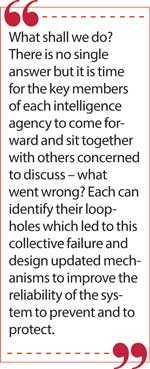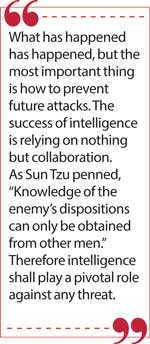Sunday Feb 22, 2026
Sunday Feb 22, 2026
Friday, 14 June 2019 00:00 - - {{hitsCtrl.values.hits}}

By Bentota Unnanse
Why do we need intelligence services? Many people are questioning this, after the Easter Sunday bombings by the extremist group ideologically inspired by Islamic State, though most of the bombers never maintained any direct contacts with the global terrorist movement. This is the first assault by such a terror outfit on this nation. Challenges are ahead.
The new global enemy is emerging before the tiny island, 10 years after it won the war that had caused internal unrest and killed unaccounted numbers of people. Different crises and opportunities require suitable solutions, and we can’t apply the old methods and strategies to solve the new problems.
However, Easter Sunday carnage is not only a tragedy but an opportunity. This heinous crime tested the capability of a nation and its political leadership. It is evident that the success of these attacks and propaganda afterwards is a collective failure of the deteriorated system.
Meanwhile, most of the politicians, with no surprise, are engaging in blaming and shaming games to justify themselves. Three major political ‘clans’ came up with three different ideas instead of working together to understand, monitor, evaluate and engineer the short term and long term counter-terrorism strategies as a part of state policies of national security.
Few days after the attacks, former President Mahinda Rajapaksa and his team consisting of ex-armed forces commanders and ex-inspector general of police came up with the counter-terrorism mechanism; this report was handed over to President Maithripala Sirisena. Hence, the report was not available for public reference; reliable sources indicated that was an assembling of strategies during the battle against the Liberation Tigers of Tamil Eelam followed over 10 years ago.
Prime Minister Ranil Wickremesinghe was the possible driving force behind the second move, where the Speaker of Parliament has appointed the special Parliament Select Committee (PSC) to ‘investigate’ the Easter Sunday bombings. At least five key members of the security apparatus were called by members of the PSC for the hearing and most of their testimonies were aired on the public domain. The method followed by this committee is different from all committees we have had in the past to investigate various sorts of crimes including alleged financial frauds.
The third step was taken by President Maithripala Sirisena who has appointed a special Presidential Committee to investigate the Easter Sunday bombings. The report of this committee was handed over to the President, and the details of the report are yet to be published. However, reliable sources say that the report finds criminal charges against the former Secretary of Defence Ministry, Hemasiri Fernando and former Inspector General of Police Pujith Jayasundara. Both officers are fighting to defend their reputations while blaming the higher authority for not taking proper actions to prevent terror attacks.
It is indeed unfortunate to see the biased media reports on a serious event like this and political motivations which are cynically attempting to manipulate everything. These politically-motivated behaviours, we are afraid, will enhance the capability of the common enemies, the Islamic extremists, while weakening the local investigative mechanism.
While keeping these three major steps in mind, it is time to understand and take immediate precautions not only to identify the common enemy challenging the nation but restore a system that would be capable enough to prevent future adversaries.
The first defence line of any nation
No country on the planet shall be protected without its intelligence, the second oldest profession in the world.
Therefore, intelligence is the first defence line of any nation and it has to be treated as priority by any ruler coming to power. Needless to explain why this most dynamic and evolving subject is important to protect the nation.
With present-day technological advances, intelligence is everywhere. Ample intelligence is spreading through public domains every moment. Some are deceptive but others are enlightening and lead us to independently know our enemies. The most difficult task is how to get the right information at the right time.
The track records of the Sri Lankan intelligence agencies have confirmed the capability of our intelligence community. At the same time, the records confirm that this community has been facing the brunt of political attacks and how it has suffered from uneducated but cunning political groups.
Sri Lankan intelligence with highly committed intelligence officers was left in vain due to this flippancy and levity in political culture in an embattled society. We as a nation failed to groom professional politicians who would execute the duties and responsibilities of intellectually-balanced public leaders in relationship with their citizens. In the name of ‘democracy’, the country has produced hollow-gangs whose ultra-motivation is dacoity of the national assets. Here, we find, Socrates is morally and ethically correct in his strong protest against ‘democracy’. “Socrates’s point is that voting in an election is a skill, not a random intuition. And like any skill, it needs to be taught systematically to people. Letting the citizenry vote without an education is as irresponsible as putting them in charge of a trireme sailing to Samos in a storm.”
Can’t we think Sri Lanka is a prime example of this tragicomedy? Sri Lanka, a sorry state, is continuing to suffer from this ill-fated system. In this brief background let us deconstruct the steps taken by the political authority to understand the Easter Sunday attacks.
Parliament Select Committee
Former President Mahinda Rajapaksa and present President Maithripala Sirisena have taken their own steps and two reports were produced. But the Speaker’s suggestion to have the Parliament Select Committee is continuing with its proceedings.
In a statement by Speaker Karu Jayasuriya and over the telephone with this writer, the President of this Committee Dr. Jayampathy Wickramaratne reaffirmed that there will be no harm to the national security, by this step.
Can these two gentlemen give us the definition of the national security in the Sri Lankan context? Certainly, Jayasuriya being a former armed forces officer turned politician and Dr. Wicramaratne being a student, who then studied physics and turned his areas of interest as law later due to some personal reason, will give us their perspectives on national security.
But neither of these gentlemen is expert on national security. In fact, we, Sri Lankans, are lacking the genuine support of such an expert in the subject. Therefore, our minds are often trapped by namesake experts who sneaked into the system to steal the information and sell it for selfish purposes. This is why we should constructively oversight the core notion of the Parliament Select Committee and its motivation – keeping in mind the past records of the persons involved and their lack of insight to foresee the problem. We are confronted by more and more sophisticated enemies all the time, and one should not forget that even by spending trillions of dollars annually, the most advanced nations led by the United States of America are not able to successfully conquer this challenge. In this war, Sri Lanka and its capability are even harder than before to see at microscopic level. Therefore, the legislators should have the sense to understand the danger of revealing any information that matters to national security.
It is truly shocking to hear the highest ranking military officer the country ever produced was insulted by one of the units of Long Range Reconnaissance Patrols, operating under the Directorate of Military Intelligence of the Army.
Field Marshal Sarath Fonseka when he was questioning one of the witnesses asseverated that the group based in Athurugiriya Millennium City was a group of incapable lost-men in Army. This comment itself is clearing the very point of the capability of this Parliamentary Select Committee and its political motivation behind the outer show. Most of those who have at least a little knowledge about the battle against the LTTE would know the role played by this LRRP group.
Most of the questions flagged were direct or indirect attempts to reveal the state mechanism the authority maintained to transmit information on national security. This, amounts to a threat to national security.
Gems for the enemies
What is regular routing that was followed by authority to share intelligence, how often and how many officials were meeting to discuss the matters on national security and what are the weaknesses (political or technical) prevailing in the systems – are all gems for the enemies. Therefore it is the prime responsibility of every legislator to protect the system and solve its wrongdoings not by taking issues into the street but in closed-door rooms where real decisions are taken by groups bound by common belief.
True, the Government as the manager of the general public has ratified the Right to Information Act, and therefore the public’s rights to know the truth without dismantling national security. About denial of access to information, the RTI protects national security by excluding sensitive information as follows:
“(b) Disclosure of such information –
i. would undermine the defence of the State or its territorial integrity or national security;
ii. would be or is likely to be seriously prejudicial to Sri Lanka’s relations with any State, or in relation to international agreements or obligations under international law, where such information was given by or obtained in confidence;
(b) The disclosure of such information would –
i.cause grave prejudice to the prevention or detection of any crime or the apprehension or prosecution of offenders; or
ii.expose the identity of a confidential source of information in relation to law enforcement or national security, to be ascertained.”
Then the authority shall deny accessing such information, the RTI affirmed.
Unfortunately, the PSC has shockingly acted in breach of these areas in public eyes several times through its proceedings. The PSC has forced witnesses to reveal the procedure that the officials are following in transmitting intelligence. The PSC has repeatedly urged witnesses to reveal the sources which gave the information on possible attacks. The effects clearly confirm undermining of the defence of national security.
In which country, would the Speaker of the Parliament compel their senior security officials to answer to a person who has not even basic knowledge on national security and its impact? The value of the information is proportionate to the intelligence already in the mind of the receiver.
In which country, would the Speaker of the Parliament allow members of his committee investigating heinous crimes to force senior security persons to unearth the sources that passed on the top secrets?
In which country, would the Speaker of the Parliament urge senior security officials to unveil the intelligence mechanism used to transmit intelligence?
It is very clear; the PSC has not undertaken relevant homework not only to understand the intelligence mechanism in the country but also the constructive objectives of the committees which will help to strengthen national security and public safety. Almost all members of the committee were not only confused about the intelligence agencies but their insufficient knowledge dilutes the potentiality of such committee.
The bottom line expectation is that the Speaker should revisit the true motivations of the PSC before it creates destructive impacts on public safety. With this background, it is important to understand how the intelligence about a possible attack by Islamic extremists was transmitted and what the questions that can be raised are.
According to the information available on a public domain, the first-hand intelligence received by the State Intelligence Service (SIS) and the director of the institute has followed the official and unofficial procedures to inform the relevant authority of the threats. What else could one expect from the intelligence agencies?
The other parallel intelligence agencies
But, there is an unheard question yet to be unearthed in relation to this scenario. What roles did the other parallel intelligence agencies play during the same time? In addition to the SIS, there are five intelligence agencies, the Chief of National Intelligence (earlier National Intelligence Bureau), the Directorate of Military Intelligence of the Army, Navy Intelligence, Air Force Intelligence, as well as Special Intelligence Unit (Special Branch) under IGP – they are all in existence to work on the intelligence in the country.
Did any of these agencies receive intelligence on possible attacks by Islamic extremists? If yes, what did they do with such information? If not, did they not receive such information? Do they honestly collaborate with the other intelligence agencies and sources?
Directorate of Military Intelligence of the Army is an independent agency under the purview of the Commander of Army and Chief National Intelligence. DMI is the biggest intelligence agency in the country. It has its own funds and better resources compared to the SIS. Yet why did they did not receive the intelligence? How many studies have the other intelligence agencies conducted on this new threat from the local part in global terrorism which is fast-evolving into social-phenomena on the planet?
What shall we do?
What shall we do? There is no single answer but it is time for the key members of each intelligence agency to come forward and sit together with others concerned to discuss – what went wrong? Each can identify their loopholes which led to this collective failure and design updated mechanisms to improve the reliability of the system to prevent and to protect.
What has happened has happened, but the most important thing is how to prevent future attacks. The success of intelligence is relying on nothing but collaboration. As Sun Tzu penned, “Knowledge of the enemy’s dispositions can only be obtained from other men.” Therefore intelligence shall play a pivotal role against any threat.
Is it time to protect them than depolarising them? Is it time to stand for them than sidelining them?
It is time to allow them to practice their duties than pulling them down. It is time to protect their reputation than allowing adverse parties to assassinate their characters and demoralise them. It is time to promulgate strong state policies that will not undermine national security, but protect it as a priority. It is time to bury petty political thoughts but stand tall for the betterment of the nation.
To be continued
(The next part: Let’s examine the HUMINT structure prevailing in the country and response to the intelligence sources on possible attacks by Islamic extremists.)